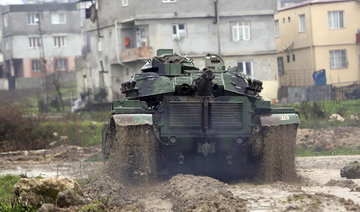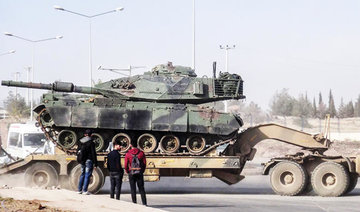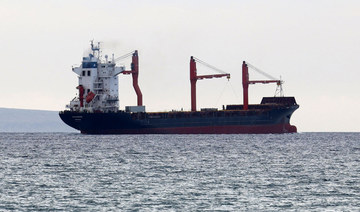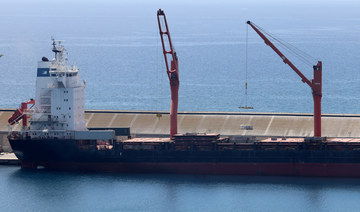ANKARA: Turkey’s military operation in north-western Syria and the participation of a Kurdish militant in recent talks in Sochi has hinted at potential cracks in the partnership between Ankara and Moscow.
Relations between the two countries fell to a low point in 2015 when Turkey shot down a Russian warplane near its border with Syria.
Months earlier Russia had launched its military offensive in support of Bashar Assad, while Turkey had backed rebel groups fighting the regime from the start of the uprising.
After the jet was brought down, there was fear a direct conflict between the two nations, but relations gradually improved leading to an agreement over safe zones in Syria last year.
Last month, Turkey’s military launched an offensive into the Syrian region of Afrin against Kurdish militants which it considers terrorists. Operation Olive Branch was only possible after Russian forces were withdrawn from the area and Turkish jets were allowed to use the airspace, which is controlled by Russia.
But that tacit support may be in doubt after Russian Foreign Ministry spokeswoman Maria Zakharova on Wednesday highlighted that the number of casualties had “reached hundreds, including civilians” and “urged the parties to exercise restraint.”
She also reiterated Moscow’s concern that the Syrian Kurdish Democratic Union Party (PYD) blamed Russia for allowing the Turkish offensive to go ahead and that Moscow had “betrayed the Kurds.”
Russia had previously had close relations with Kurdish groups in Syria.
Another point of contention was the participation of Mihrac Ural, a Kurdish militant wanted in Turkey, in the Russian sponsored peace talks in Sochi on Tuesday.
Ankara was angered that Ural attended the talks as a delegate in the pro-Assad groups. He is the leader of an outlawed organization, the People’s Liberation Party-Front (THKP-C), that Turkey says killed 52 people in an attack in Hatay province in 2013.
Turkish Foreign Minister Mevlut Cavusoglu said on Thursday that Turkey had asked Russia to extradite Ural.
President Recep Tayyip Erdogan also spoke with Vladimir Putin on the phone on Wednesday to discuss the outcome of Sochi Congress, which failed to make diplomatic headway toward resolving the war.
Experts think that the Kurdish situation will become increasingly problematic for cooperation between Turkey and Russia in Syria in the coming months. But they say the two countries will try to remain united on key issues about the future of Syria — including the fight against Daesh.
Emre Ersen, an expert on Syria from Marmara University in Istanbul, said Russia’s call for restraint in Afrin was a reminder that their cooperation over Syria is “an alliance of convenience.”
“The outcomes of the Sochi Congress have been somewhat underwhelming,” Ersen told Arab News.
“This was partly because the Russian leaders failed to convince Turkey to delay its military operation in Afrin.
“Both countries are aware that they need each other in Syria, although they have important concerns regarding the intentions of one another.”
Turkey and Russia are dependent on each other in reaching their own objectives in Syria.
Turkey needs Russia’s consent for Operation Olive Branch to be a success and Russia needs Turkey for Moscow’s plans in rebel-held Idlib province, Ersen said.
The rift over the Kurdish operation between Turkey and the US, which supports the Kurdish militants as part of its strategy against Daesh, also means that the cracks between Ankara and Moscow will not develop into a schism.
“Moscow is aware of the serious disagreements between the two Nato allies and it wants to continue to exploit this situation to its own advantage not only in Syria, but also in terms of its ongoing geopolitical rivalry with Nato in East Europe and the Black Sea,” Ersen said.
Timur Akhmetov, a researcher at the Russian International Affairs Council, said Russian diplomatic successes were made possible by skillful balancing between major rival parties.
“Russia has never claimed or wanted to abandon Syrian Kurds once and for all,” he told Arab News.
Russia’s main motive for allowing the Turkish offensive in Afrin was to warn the PYD about its cooperation with the US as it could harm the sovereignty of the Syrian state.
“Russian diplomatic officials now are trying to restore the balance and send positive signal to the Kurds. I think we must see this as a policy of stick and carrot,” Akhmetov said.
“I think Russian officials believe that Turkey will be much more inclined to push Kurds under the influence of Damascus and Russia rather than leave them under the US, considering American plans to establish a long-term presence in northern Syria,” he added.
The PYD has had a political office in the Russian capital for two years, while Russian observers in Afrin had been in close cooperation with the PYD’s military wing, the People’s Protection Units (YPG) until the beginning of Turkish offensive.
Both groups are considered by Ankara to be “terrorist”, and associated with the outlawed Kurdistan Workers’ Party (PKK) that was waged a decades-long insurgency against the Turkish state.
Afrin offensive strains Turkey and Russia’s ‘alliance of convenience’
Afrin offensive strains Turkey and Russia’s ‘alliance of convenience’

Officials discuss plans for 54th session of the Council of Arab Information Ministers

- Arab League’s assistant secretary-general and Bahrain’s minister of information review agenda for the 3-day ministerial meeting, which begins on Monday
- A key item is the implementation of an Arab Media Strategy to Combat Terrorism
CAIRO: The Arab League’s assistant secretary-general and head of its media and communication sector, Ambassador Ahmed Rashid Khattabi, and Bahrain’s minister of information, Ramzan Al-Nuaimi, discussed the agenda and arrangements for the 54th session of the Council of Arab Information Ministers, which will take place on May 27 to 29.
Their meeting followed the Arab Summit in Manama last week, which issued resolutions relating to various strategic, political and developmental issues affecting the Arab region. It also explored ways to enhance mechanisms for Arab cooperation, including media support for the Palestinian cause in light of the latest developments and the repercussions of Israel’s war on the Gaza Strip.
Khattabi and Al-Nuaimi reviewed the draft agenda for the upcoming ministerial meeting, which was approved by the Executive Office of the Council of Arab Information Ministers during its meeting on Dec. 24 in Libya.
It includes several items related to proposed projects for the development and enrichment of a comprehensive and diverse Arab media system. A key item is the implementation of an Arab Media Strategy to Combat Terrorism, which was approved during the Arab Summit.
Other significant topics include a media map for achieving sustainable development by 2030; environmental media; educational media; ways to enhance the status of women in the media; and the development of capacity through the use of artificial intelligence technology.
The agenda also includes a proposal by the General Secretariat for the development of a charter detailing the responsibilities of the media in coverage of elections. It includes issues such as the role of the media in electoral campaigns; respect for the rules of pluralism, transparency and neutrality; and the prevention of discrimination based on gender, race or language.
During their meeting next week, the information ministers will also discuss organizational matters, and the winners of the eighth Arab Media Excellence Awards will be announced on the sidelines of the event. More than 100 entries were submitted and the winners chosen by a special committee of judges from member states, chaired by Kuwait, the sponsor of the awards.
At least 85 dead from fighting in Sudan’s El-Fasher: charity

- On Monday alone, nine of 60 casualties received at Southern Hospital — El-Fasher’s only remaining medical facility — had died of their wounds
- El-Fasher is the only state capital in the vast western region of Darfur not under RSF control
PORT SUDAN: At least 85 people have died in a single hospital in the Darfur city of El-Fasher since fighting reignited between Sudan’s warring parties on May 10, medical charity Doctors Without Borders said Tuesday.
On Monday alone, nine of 60 casualties received at Southern Hospital — El-Fasher’s only remaining medical facility — had died of their wounds, said Claire Nicolet, head of the charity’s Sudan emergency program.
In the period since the fighting erupted in the North Darfur state capital, the hospital had received “707 casualties” and “85 have passed away,” she added.
For over a year, fighting has raged between the regular military, under army chief Abdel Fattah Al-Burhan, and the paramilitary Rapid Support Forces, led by his former deputy Mohamed Hamdan Dagalo.
El-Fasher is the only state capital in the vast western region of Darfur not under RSF control and is a key humanitarian hub for a region on the brink of famine.
This month, it has been the site of fierce battles, despite repeated pleas including from the United Nations for fighters to spare the city.
Eyewitnesses have reported repeated artillery shelling and gunfire from both sides, as well as air strikes from the army.
Trapped in their homes by the fighting, many residents are unable to brave the violence on the streets to get wounded loved ones to the hospital.
Doctors Without Borders said casualties who reach Southern Hospital are met by “only one surgeon, putting the facility “under intense pressure.”
Across the country, the war has shuttered over 70 percent of medical facilities and stretched the remaining ones impossibly thin.
“We have only around 10 days of supplies left” for Southern Hospital, Nicolet said, urging the warring parties to provide “safe access” to enable them to replenish stocks.
Since the war began, tens of thousands of people have been killed, including up to 15,000 in a single West Darfur town, according to UN experts.
Nearly nine million people have been forced from their homes. By the end of April, North Darfur alone hosted more than half a million people newly displaced in the last year, according to the latest figures from the UN.
Houthis claim 5th US drone shoot-down since November

- The Houthi military launched “a locally made surface-to-air missile” at the US MQ-9 Reaper drone
- The Houthi claim on Tuesday was the second in less than a week concerning an MQ-9 Reaper shoot-down, and the fifth since November
AL-MUKALLA: Yemen’s Houthis claimed on Tuesday to have shot down another US drone over the central province of Al-Bayda, marking the fifth such claim by the militia since the start of their Red Sea campaign in November.
Spokesman Yahya Sarea said in a televised broadcast that the Houthi military launched “a locally made surface-to-air missile” at the US MQ-9 Reaper drone, which crashed in Al-Bayda province.
Sarea did not disclose when the shoot-down took place, but said the military action came in support of the Palestinian people and as retribution for US and UK bombings of Houthi-controlled parts of Yemen.
“The Yemeni Armed Forces continue to enhance their defensive capacities in order to face the American-British aggression against our nation and carry out military operations in triumph for the oppressed Palestinian people,” Sarea said.
The Houthi claim on Tuesday was the second in less than a week concerning an MQ-9 Reaper shoot-down, and the fifth since November.
On Friday, the militia said its forces shot down a US drone over the central province of Marib while conducting “hostile operations,” soon after locals reported hearing a loud blast and finding wreckage of a drone resembling an MQ-9 Reaper.
The Houthis had previously claimed to have shot down the same drone model on April 26 and Feb. 19 this year, as well as on Nov. 8 last year, over Saada, Hodeidah and the Red Sea, respectively.
Since November, the Houthis have attacked ships in international waters around Yemen, mainly the Red Sea, using drones, ballistic missiles and drone boats.
The militia claims its campaign is solely targeting Israel-linked ships in solidarity with Palestinians in Gaza.
The US has responded to the Houthi attacks by identifying the militia as a terrorist organization, organizing a coalition of marine task forces and carrying out strikes on Houthi sites in Yemen.
In an attempt to revive peace talks stalled by the Houthi Red Sea campaign, the US State Department said on Monday that Yemen envoy Tim Lenderking will return to Saudi Arabia, the UAE and Oman.
He will meet officials in those countries to discuss the Houthi Red Sea campaign and its implications on Yemen’s peace process.
“The Houthis’ continued attacks threaten progress toward achieving a durable resolution to the conflict in Yemen and obstruct the delivery of humanitarian assistance to Yemenis and people in need across the region,” the US State Department said.
UNRWA says food distribution in Rafah suspended due to insecurity

- UNRWA said in a statement on X that only seven out of its 24 health centers were operational and that it had not received any medical supplies in the past 10 days
DUBAI: The UN agency for Palestinian refugees (UNRWA) said on Tuesday that food distribution in Gaza’s southern city of Rafah were currently suspended due to lack of supplies and insecurity.
UNRWA said in a statement on X that only seven out of its 24 health centers were operational and that it had not received any medical supplies in the past 10 days due to “closures/disruptions” at the Rafah and Kerem Shalom crossings into Gaza.
Israel mounted a new push in central Gaza on Monday, bombarding towns in the north of the Palestinian enclave and saying it intended to broaden operations in Rafah despite US warnings of the risk of mass casualties in the southern city.
Simultaneous Israeli assaults on the southern and northern edges of Hamas-ruled Gaza this month have caused a new exodus of hundreds of thousands of people from their homes, and sharply restricted the flow of aid, raising the risk of famine.
Cyprus says maritime aid shipments to Gaza ‘on track’

- 1,000 tons of aid were shipped from Cyprus to the besieged Palestinian territory between Friday and Sunday
- The vessels were shuttling between Gaza and the east Mediterranean island
NICOSIA: Four ships from the United States and France are transporting aid from Larnaca port to the Gaza Strip amid the spiralling humanitarian crisis there, the Cyprus presidency said on Tuesday.
Victor Papadopoulos from the presidential press office told state radio 1,000 tons of aid were shipped from Cyprus to the besieged Palestinian territory between Friday and Sunday.
He said the vessels were shuttling between Gaza and the east Mediterranean island, a distance of about 360 kilometers (225 miles).
Large quantities of aid from Britain, Romania, the United Arab Emirates, the United States and other countries have accumulated at Larnaca port.
Cyprus President Nikos Christodoulides told reporters on Tuesday the maritime aid effort was “on track.”
“We have substantial assistance from third countries that want to contribute to this effort,” he said.
The aid shipped from Cyprus is entering Gaza via a temporary US-built floating pier, where the shipments are offloaded for distribution.
The United Nations has warned of famine as Gaza’s 2.4 million people face shortages of food, safe water, medicines and fuel amid the Israel-Hamas war that has devastated the coastal territory.
Aid deliveries by truck have slowed to a trickle since Israeli forces took control of the Palestinian side of the Rafah crossing with Egypt in early May.
The war in Gaza broke out after Hamas’s unprecedented attack on Israel on October 7, which resulted in the deaths of more than 1,170 people, mostly civilians, according to an AFP tally based on Israeli official figures.
Two days after the war broke out, Israel’s Defense Minister Yoav Gallant ordered a “complete siege” on the Gaza Strip.
Israel’s retaliatory offensive against Hamas has killed at least 35,647 people in Gaza, also mostly civilians, according to figures provided by the Hamas-run territory’s health ministry.






















